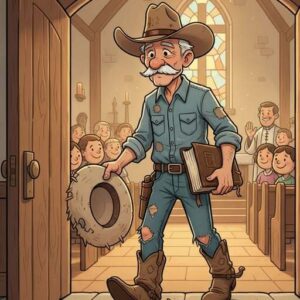He Missed My Graduation, But I Got Something Better
My dad refused to attend my graduation because his stepdaughter has an award ceremony on the same day. It’s not the first time he did this. I told him to forget about being included in my life going forward. Later, his wife approached me and said I was being dramatic.
“Family should understand things like this,” she added, with a tired sigh, like I was a toddler throwing a tantrum.
I didn’t even bother replying. She always had this way of talking like everything she and my dad did was completely justified. I guess they really believed it too.
The truth is, it wasn’t just about the graduation. It was the last straw in a long line of being second-best. My dad remarried when I was twelve. I’ll never forget the way his attention shifted so fast. At first, I told myself I was just imagining things, that maybe it was hard for him to balance two families. But eventually, it became obvious: I was no longer a priority.
Birthdays were forgotten. School plays missed. When I broke my arm in high school after falling off the balance beam, he didn’t show up to the hospital. He texted, “Hope you’re okay. I’ll come by later this week.” He didn’t.
Still, I kept hoping. Every big milestone, I thought, maybe this time. Maybe he’ll remember. Maybe he’ll come. Graduation was supposed to be different. I even called him a month before and reminded him. He said he’d try, but then came that message: “Hey, can’t make it. Her award ceremony is that day. Hope it’s a great one!”
I didn’t reply. I cried. And then, for the first time, I stopped hoping.
That’s when I told him not to bother trying anymore. Not to text. Not to ask about my life later on like nothing happened. His wife’s little speech afterward just confirmed I made the right choice.
But something unexpected happened a few weeks later.
I was back home, packing for a summer internship in another city. Mom was helping me fold clothes when she said, “You got a letter.”
She handed me an envelope. It was thick, cream-colored, no return address.
Inside was a handwritten note from my dad’s mother. My grandma, who I hadn’t seen in almost five years. Not because we fought—she just lived in another state and after the remarriage, visits became rare. Still, I remembered how she used to bake cherry pies and tell me stories about her childhood.
The letter was short.
“Sweetheart, I heard what happened. I’m sorry. I want you to know you’ve always mattered to me. I would love to see you. If you’re willing, come visit me sometime soon.”
I stared at the note for a long time. I hadn’t even realized she knew about the graduation. I didn’t even know she remembered me, to be honest.
“Maybe you should go,” Mom said, gently. “Not everyone on that side forgot you.”
A week later, I packed a bag and took a bus to her town. I told myself it would just be a quick visit.
But that trip turned into something way more important.
When I arrived, she was waiting at the station with a big smile and arms wide open. She hadn’t changed much. Still had her silver curls pinned up, still smelled like cinnamon and roses.
She took me to her cozy little home where everything felt like a warm hug. Photos on the walls. Doilies on the furniture. And on the mantel, to my surprise, a framed photo of me—me at ten, holding a soccer trophy.
“I never took it down,” she said, noticing my gaze. “You were always my girl.”
We spent the evening talking. And I mean really talking. I told her everything—things I never even said out loud before. About how invisible I’d felt. About how I kept trying with Dad, over and over, until I couldn’t anymore.
She listened. She held my hand. Then she said something that changed everything.
“You know, your dad… he wasn’t always like this. After the divorce, he got scared. Scared he’d lose love again. So when he remarried, he clung to that new family like a lifeline.”
“That doesn’t excuse it,” I said quietly.
“No, it doesn’t,” she agreed. “But it helps understand it. Sometimes broken people don’t know they’re hurting others while trying to fix themselves.”
I didn’t reply. I wasn’t ready to forgive. But I appreciated the honesty.
The next morning, she asked if I wanted to help her with something. Her neighbor, Mr. Caldwell, needed help organizing his late wife’s books for donation.
I said yes, not thinking much of it. But that day turned out to be the start of something new.
Mr. Caldwell was this grumpy-looking guy in his seventies, with a scratchy beard and a voice like gravel. But the moment we stepped into his late wife’s reading room, something softened in him.
“My Nora loved her books,” he murmured. “I couldn’t bring myself to touch them until now.”
We spent hours sorting through old paperbacks and leather-bound novels. I found old love notes tucked between pages. A tiny dried rose. Even a ticket stub from a movie in 1974.
Something about that experience hit me hard. How memories live in the smallest things.
Mr. Caldwell noticed my interest. The next day, he called and asked if I could help him set up a small “reading corner” at the local community center in memory of his wife.
I said yes. Again, not thinking much of it.
But word spread fast in the small town. Soon, others came forward with books to donate. A few retired teachers offered to host story times for kids. Within weeks, the “Nora Caldwell Reading Nook” became a real thing.
And somewhere along the way, I found myself… healing.
I stayed longer than I planned. I extended my internship to remote. Grandma’s town felt like a place where things made sense. People said hi. Strangers became friends. And for the first time, I didn’t feel like I was chasing someone else’s attention.
Three months later, something even more surprising happened.
I got an email from my dad.
Subject line: Can we talk?
I ignored it. For a week. Then another email came.
This one was different. No excuses. Just raw honesty.
“I was wrong,” he wrote. “I prioritized someone else over you. Repeatedly. There’s no excuse. I think I told myself you were fine without me, but deep down I knew that wasn’t true. I’m so sorry. If you never want to see me again, I’ll understand. I just needed to say it.”
I sat with that email for hours.
Then I forwarded it to Grandma. Her reply? Just one line.
“Sometimes, doors open again when we least expect them.”
Still, I wasn’t ready to forgive.
But I decided to meet him.
We agreed to a coffee shop halfway between our towns. I brought a friend just in case I wanted an escape. But when I saw him waiting there, hair grayer than I remembered, shoulders hunched, I didn’t feel anger. Just… tired.
He stood up when he saw me.
“You look… grown,” he said.
“I am.”
We sat. He apologized again. He cried. I didn’t. I told him forgiveness isn’t a switch you flip. It’s a road. Maybe I’d walk it, maybe not. But at least now he was being honest.
He asked if he could write to me sometimes. Not to fix things overnight—just to start over, slowly.
I said okay.
Now, months later, we write letters. Real ones. Paper and ink. Sometimes they make me smile. Sometimes I cry. But I’ve learned something important: people can change. But you don’t have to wait around for them to.
You don’t have to keep knocking on doors that don’t open. You can walk away, heal, grow, and still be open to reconciliation later—on your terms.
My grandma passed away peacefully this spring. She left me her house and a note that said: “You brought joy back into my life. Now go do that for others.”
So I stayed in her town. I run the reading nook now. We expanded into a small nonprofit that gives kids free books every month. Mr. Caldwell still drops by, grumbling about how I “move the chairs too much,” but he secretly loves it.
As for my dad—he came to the grand re-opening of the reading nook. Brought flowers. Stood in the back, quiet. I let him stay.
We’re not where we used to be. But we’re somewhere.
The truth is, sometimes family lets you down. Deeply. And it hurts. But sometimes, from that hurt, something else grows. New connections. New strength. New peace.
If someone reading this is feeling forgotten, like they’re always second-best—please know this:
Your worth is not measured by who shows up for you.
It’s measured by how you rise anyway.
So rise.
And if this story meant something to you, please share it. You never know who needs to read it right now.





